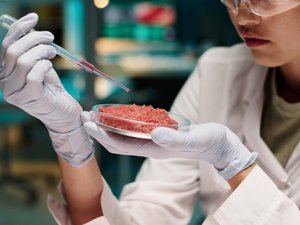
Eat Just has launched its first lab-grown meat product for consumer retail sales, a shredded chicken alternative, but the product is mostly plant-based for now.
The Alameda-based startup is developing lab-grown, or cultivated, meat through its Good Meat division and received approval last year from U.S. regulators to sell its cultivated chicken.
The company also has approval to sell it in Singapore, where the new shredded chicken product launched on Thursday for retail sales.
Sold under the label of Good Meat 3, the product only contains 3% cultivated chicken. The remainder is plant-based.
"Using a smaller percentage of cultivated chicken in combination with plant proteins ... helps reduce costs associated with the production of cultivated meat, one of the main challenges that exist to scaling this developing industry," the company explained in a blog post announcing the retail launch.
A package containing 120 grams (approximately 4.2 ounces) of the product will sell for $7.20 SGD, or $5.35 in U.S. dollars. That would price the product at a little over $20 per pound.
Good Meat has also developed chicken strips that contained 63% cultivated meat, the company told the San Francisco Business Times last year. Those chicken strips were served, at least for a brief time, at China Chilcano, a D.C-based restaurant owned by celebrity chef José Andres.
Most other cultivated meat and protein companies in the Bay Area are developing hybrid recipes that contain a blend of meat cells and plant-based ingredients:
- SciFi Foods is using between 10% to 20% cultivated meat in its hamburger patties;
- Mission Barns has a bacon product with around 30% meat;
- Finless Foods is developing a seafood product that's 51% cultivated tuna;
Upside Foods, by contrast, says its chicken filet is 99% cultivated meat.
“As we think about actually truly scaling this, moving from hundreds to thousands to hundreds of thousands to tens of millions to hundreds of millions of pounds, then the percentage will be a much more important factor in what production will actually be,” Eat Just CEO Josh Tetrick previously told the Business Times.
The FDA has indicated that it will jointly oversee and develop requirements for properly labeling cultivated meat products with the U.S. Department of Agriculture, but it has not updated its regulatory guidance since March 2023, when it characterized the stage of the process as "premarket consultation." The agency didn't respond to a request for more information.
Florida has preemptively banned cultivated meat products in the state.
Gov. Ron DeSantis signed a law on May 1 banning the sale and manufacturing of cultivated meats. The rationale was to push back against an alleged scheme from "the global elite" that wants to "force the world to eat meat grown in a petri dish."
Tetrick responded to the Florida ban in a social media post.
"@GovRonDeSantis, I'm from Alabama, mom is a hairdresser, grew up poor. This is a loss for your state," Tetrick wrote on X.








